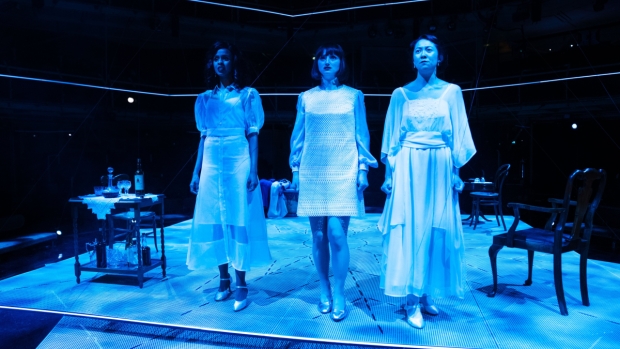Nora: A Doll's House at Royal Exchange Theatre – review
Stef Smith’s adaptation of the Ibsen classic runs until 2 April

© Helen Murray
Less than a mile from Manchester's Royal Exchange stands a statue of Emmeline Pankhurst. Her activism to win women the vote is one of the first references in this new revival of Stef Smith's adaptation of Henrik Ibsen's domestic classic. Whereas Ibsen denied any feminist intent, Smith and director Bryony Shanahan present a study of the way patriarchy takes a stranglehold.
Smith's intervention is to treat the woman as tessellated shapes of a female archetype, tripled as Nora 1, 2 and 3. Chairs are positioned facing each other in opposite corners – reflections cast across thresholds. When they address each other, it's like she's pleading with herself to escape. Jodie McNee's Nora thumps her chest in concern for her children – motherhood is a definition of her sense of self. The permanent toybox is both a reminder of their children and her maternal "duty", as well as her status as one of her husband's playthings.
Indeed, when Kirsty Rider's Nora lashes out, she instinctively drops to her knees as quickly as a doll would fall to the floor. Rider's voice is often strangulated into near-whimpering, asphyxiated high notes like the men's hands are constantly clasping her throat. Contrastingly, Yusra Warsama's lips jerk into jagged corners as a barely contained snarl, casting her looks down with her eyelids half-closed as though he's not worth the effort of opening them.
Amanda Stoodley patterns the stage with broken, dashed lines – the sewing of Nora's housework as well as parallels stitched across time. Cords rise up from these seams as though the women are puppeteered. They're cast up from the stage's perimeter like the bars of a birdcage, so she appears the "songbird" of her husband's possessive fantasy. The stage revolves the more she resents him, stretching the threads closer to snapping.
The stage is also perforated, porous – the same moments seeping through the ages from past to present. While the women appear to change, the men stay the same in unchanging period costumes, haunting them like a shadow. The same issues and conflicts play out again in a closed loop of constantly thwarted, abortive efforts. No sooner has she exercised power and agency through money and voting, than she's blackmailed over her borrowed money as debt is equated to death.
In many ways, however, it's more of an interesting intellectual idea and cerebral exercise. You wonder if the audience could discern the point that nothing's really changed from the resonances of Ibsen's plot, without having to watch it set in three different periods. The tripling denotes its effort in expounding the play's themes. Their suffocation is stressed by synchronised, exaggerated breathing in transitions, while wild dancing is the only mode of representing cathartic liberation. Smith's script is equally obvious with dialogue like "it's always so different for men" and "what if love isn't enough?"
Likewise, while her husband's chauvinism begins as insidious microaggressions, it becomes manifest bullying in the second half with heavy repetition of the "skylark" and "songbird" epithets. A more menacing presence is Nora's blackmailer, Nathan, who barely veils his disapproval of women's political voice at the start. Andrew Sheridan's twitchy performance convinces you of his discomfort, barking at Nora while straining and stiffening the longer he's in her company.
The final decision she reaches outraged audiences as a radical gesture at the 1879 premiere. With slightly less overt writing and staging, this adaptation could've struck more chords in today's audience.












